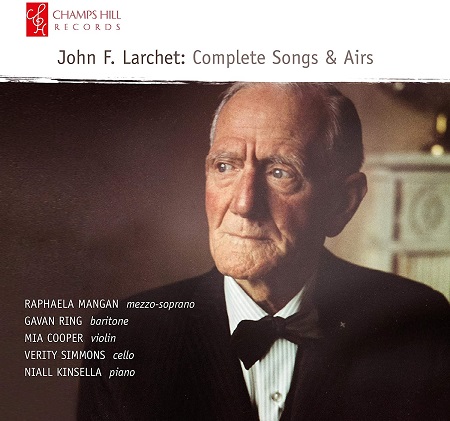Larchet studied at the Royal Irish Academy of Music, where he was guided
and influenced by Michele Esposito (1855-1929) - the Italian-born Director,
who introduced him to European musical traditions and contemporary
developments, particularly those in Germany. After advanced studies at
Trinity College Dublin (he received his MusB in 1915 and completed his MusD
in 1917), he joined the staff of the RIAM in 1920, and succeeded Esposito
as Senior Professor of Composition, Harmony and Counterpoint, a role he
held until 1955. As a teacher, Larchet was influential in developing a
school of Irish composers, many of whom went on to become important figures
in Irish composition. He supplemented his part-time position at the RIAM,
with a professorship at University College Dublin (1921-58), and was also
Director of Music at the Abbey Theatre from 1907 to 1934, during which time
he composed much incidental music including for W.B. Yeats’s plays. The
National University of Ireland awarded him an honorary DMus in 1953, and in
1958 he received the order of Commendatore from the Italian government.
Larchet’s 1954 arrangement of the Irish national anthem remains the
official version.
Today, however, at least in England, we hear little of Larchet’s music or
of his crusading musical activities. So, I’m curious to learn why Irish
pianist Niall Kinsella became so fascinated by this figure from the
historical and musical past, and so drawn to his music that he set out upon
a mission to track down and record Larchet’s entire oeuvre of ‘art songs’,
a venture that will come to fruition in August when the resulting CD is
released on the Champs Hill label.
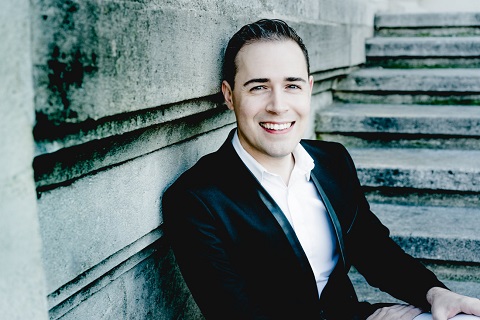 Niall Kinsella. Photo credit: Andrej Grilc.
Niall Kinsella. Photo credit: Andrej Grilc.
It was during his student years at UCD, Niall tells me, that he first came
across Larchet’s music. His name was familiar, not least because of the
College’s biennial Larchet Memorial Lecture Series (the first John F.
Larchet Memorial Lecture was delivered by Joseph Kerman in 1995, as the
keynote address at the Maynooth International Musicological Conference). A
student friend was singing one of Larchet’s songs, ‘A Stoirin Ban’, and
Niall accompanied her: he was struck by the beauty and originality of the
song, as well as the folksong-influenced idiom: “People in every country
are touched by their native folksong, by the melodies, and it was this that
made such an impression on me.” On this recording, mezzo-soprano Raphaela
Mangan’s crystalline lyricism certainly captures the song’s melodic
strength and poignant tenderness.
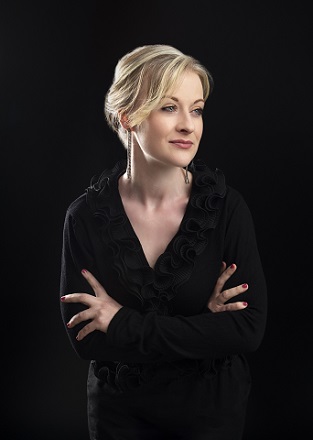 Raphaela Mangan (mezzo-soprano).
Raphaela Mangan (mezzo-soprano).
Slowly Niall began investigating and tracking down Larchet’s art songs in
English. Time passed, but the wish to record the fifteen songs that he had
accumulated gradually increased, particularly as his own career as a
pianist and lieder accompanist, working with different singers, had
developed and the time to record his first CD seemed ripe. In 2016 he
returned to this project and contacted Raphaela Mangan, with whom he had
collaborated since 2012, and baritone Gavan Ring. Two live performances of
Larchet’s songs followed, the second of which at NCH Dublin, formed part of
Kinsella’s Irish Songmakers series. The first concert had by
chance been recorded, and Niall sent the recording to Champs Hill Records,
in the hope that a label which was not afraid to champion newly emerging
musicians and little-known repertoire might be interested in the project.
“They were warm and enthusiastic from the start,” Niall explains, “and with
the incredible generosity of Mary and David Bowerman we were able to go
ahead.”
So, 15 years after he first encountered Larchet’s music, and after much
research and planning, in 2018 the recording took place, but it was not
until 2020 that Niall actually heard the songs from ‘beginning to end’.
“I’d heard the songs during the editing process, but the actual CD arrived
during lockdown. As for all musicians, this was a period when there was
little happening, and it was such a lift to receive the CD.” It has been
such a journey, one which came to involve Larchet’s family - his two
daughters Máire and Sheila, and his grand-daughter
Anne - who had attended the performances in 2017 and 2018. “It made the
project so personal,” reflects Niall. “I was living in Vienna at the time
[studying at the University for Music and Performing Arts] and I’d been
practising Larchet’s songs and writing a ‘script’ for the concert which
would introduce the audience to Larchet’s life and work. I realised that,
while he was quite a ‘distant’ figure for me, Larchet was Máire and
Sheila’s father, and I felt quite a weird connection with the composer,
even though he had died 20 years before I was born. After the concert and
during the preparation of the CD, I met with his two daughters and Anne,
who talked to me about Larchet’s life and the musical culture at that time.
Máire and Sheila knew the songs really well! They were part of their life,
and they were able to sing them and quote the texts.”
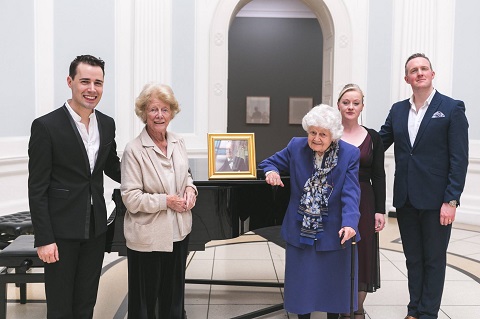 Niall Kinsell, Maire Larchet, Sheila Larchet, Raphaela Mangan and Gavan Ring.
Niall Kinsell, Maire Larchet, Sheila Larchet, Raphaela Mangan and Gavan Ring.
Subsequently, Niall had a further ‘special moment’. He managed to locate
two additional songs that had been lost or out of print for over 100 years
- and that had not been included in the two concerts or on the CD. Sadly,
by this time, Máire had passed away, aged 97. Niall approached Sheila and
asked her if she knew anything about two songs that received a passing
mention on Wikipedia (not always the most reliable of sources!); she
thought it was probably a mistake, but Niall, curious by nature, contacted
a Larchet scholar in November 2019 who suggested that, although it was
probably a misattribution, he might check with the British Library, the
reported home of the only manuscripts. The two songs were duly located, and
so it was back to the studio to record two more tracks. Niall kept his find
a secret from Sheila. At 97 years old, she was ‘cocooning’ during lockdown,
and he was delighted to be able to send her copies of both the CD and of
the scores of the two extra songs. One can only imagine how moving it must
have been for her to have her past made present, and to discover something
‘new’ about her personal history.
Here, Gavan Ring’s firm and rich baritone captures every drop of the
Romantic ardour of ‘Love’s Question’ while Kinsella ensures that the
flowing momentum evokes the singer’s compelling passion, which drives the
song to a stirring conclusion. ‘Love, and a Garden’ restores a quieter more,
restful mood, and Mangan eases through the well-shaped melody with grace and
varied colour, supported by the gentle breathing of the piano
accompaniment.
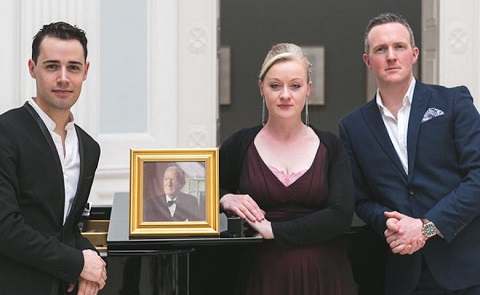 Niall Kinsella, Raphaela Mangan and Gavan Ring, ‘John F. Larchet Remembered’, 19th January 2018, John Field Room, National Concert Hall.
Niall Kinsella, Raphaela Mangan and Gavan Ring, ‘John F. Larchet Remembered’, 19th January 2018, John Field Room, National Concert Hall.
I ask Niall how he evaluates Larchet’s role in Irish musical history, as a
composer, educator and as a driving force in both the institutions which
supported the creation of new repertoire and the communities amongst which
it was received. Of primary importance, Niall believes, is the fact that
Larchet made it possible for Irish musicians to study in their native
country, whereas previously they had had to travel abroad, often to London
to have lessons with Vaughan Williams or Stanford. Among his pupils were
Michael Bowles (1909-98), Walter Beckett (1914-96), Joan Trimble
(1915-2000), and Havelock Nelson (1917-1996). Although Larchet was a little
self-deprecating about his role in establishing a ‘school’ of Irish
composers, he was indeed pivotal, many of his students themselves going on
to become teachers, Frederick May (1911-85), Brian Boydell (1917-2000) and
Seóirse Bodley (1933 - ) among them. “Their personal styles are different
to Larchet’s, but there is a ‘whisper’ of folk-music in their music.”
Moreover, as an administrator Larchet was instrumental to the development
of Irish music. “He virtually set up the Music Department at UCD” and he
served as principal examiner for the Irish Department of Education and for
the local centre examinations of the RIAM, “travelling around Ireland as an
examiner for the National Music Examination Board. His influence was felt
far beyond Dublin, and across the whole country.” This reminds me of the
career of Sir Arthur Somervell, who alongside his compositional activities
had a long career as a Civil Servant, succeeding Stainer as Inspector of
Music to the Board of Education in 1900, and being promoted to Principal
Inspector in 1920, and who was responsible for establishing music as a
serious and widely studied school subject. Niall agrees - and another
similarity is the two men’s predilection for the genre of song, and their
skills as ‘miniaturists’, though Larchet frequently repurposed his songs -
and violin pieces - as chamber works. The Complete Songs and Airs
also includes the premiere recording of Larchet’s two sets of ‘Irish Airs
for Violin and Piano’, performed by Mia Cooper. Loving cradle songs and
touching laments contrast with vibrant hornpipes and roistering reels, but
Larchet’s effortless lyricism is always present and powerful.
Another aspect of Larchet’s career that intrigues me is the extent to which
he was interested in, or committed to, contemporary musical developments,
especially in Germany and on the continent. “I think that there are some
composers who essentially look back, such as Brahms, and those who are
pushing the musical envelope and stretching musical forms and language to
the limits, such as Richard Strauss,” suggests Niall. I think that Larchet
was one of those who looked back. He was immensely influenced by Wagner; it
was hearing his music - especially Tannhäuser - that made him want
to be a musician. And also by Elgar; knowing that, I began to hear many
parallels in his music.”
 Gavan Ring. Photo credit: Frances Marshall.
Gavan Ring. Photo credit: Frances Marshall.
Early in his career, Larchet wrote an article, or credo, ‘A Plea for
Music’: ‘A dispassionate analysis of the present position of music in
Dublin is rather discouraging. It possesses no concert hall, good or bad,
and no permanent orchestra which could be called a symphony orchestra.
Except for occasional visits from some of the English orchestras, there has
been no performance of any importance or educative value in Dublin for ten
years. This means that most of the people have no knowledge of Strauss,
Brahms, and the great volume of modern orchestral music. Few are acquainted
with any important works of later date than Wagner’s ’Ring of the
Nibelungen’. Little interest is taken in chamber music or choral music; a
large percentage of music lovers in Dublin have never heard a string
quartet. Solo instrumental recitals, or classical song recitals, are few
and far between, and are only attended by a small circle of enthusiasts, or
by those personally interested in the artist. In such circumstances, it is
inevitable that Dublin should contribute nothing to the support or progress
of music.’
“Larchet’s idiom might sometimes seem ‘twee’ to our modern ears, but we
need to judge it by the standards of his time and context. These are art
songs, which are influenced by folk traditions and idioms. His early songs,
composed between 1906-10, were designed to appeal to a cosmopolitan
audience. They were published by London-based publishing houses, and one
senses that Larchet was writing for a particular English market.
Subsequently, songs such as ‘The Cormorant’ (1947) are more progressive but
still make use of modes and folk elements. It’s as if Larchet had one foot
in the past and one foot in the present.” ‘The Cormorant’, sung here with
focused intensity by Gavan Ring, does indeed strike me as one of the most
impressive of Larchet’s songs, quasi-theatrical in impact, complex in
structure, its idiom more flexible, and restless, in responding to Emily
Lawless’s poetry, creating immediacy and drawing the listener into the
song’s drama.
I wonder if Larchet’s perceived conservatism is one factor in his relative
‘obscurity’? Niall agrees: “Irish art songs are rarely taken up in the way
that English art songs are. There are also practical constraints - many are
out of print, published by Irish companies that are long gone.” I reflect
that at the Wigmore Hall, for example, one rarely hears a non-Irish singer
performing this repertoire, and even then, only as an encore. “Yes, I don’t
know if it’s shyness, or embarrassment, but it’s rare even in Ireland for
these art songs to be included in the core of a programme.”
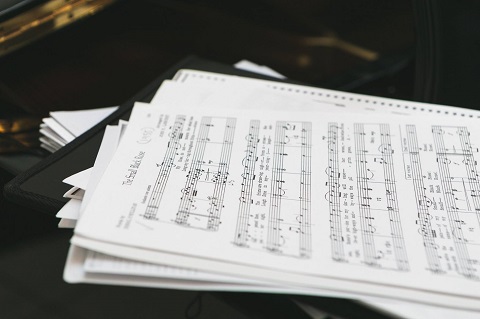
In a sense, Larchet is a complexity of paradoxes and contradictions. He set
both English poetry - including poems by Yeats and Shelley (
‘The Philosophy of Love’
is included on the CD) - and Gaelic traditional texts. He chose to compose
art songs, when political and religious circumstances did not encourage
their performance or positive reception, given the dual counterforces of
Celtic nationalism and financial adversity. Mark Fitzgerald has written
pertinently about the development of contemporary music in Ireland, noting
that it was ‘not just of Ireland’s peripheral position in relation to the
centres of modernism in music, but also of a chronic lack of investment in
the extensive capital needed to foster the development of music during the
period of colonial governance in Ireland’
[1]
. ‘The parlous finances of the country in the early years of the Free State
were not favourable for investment in the arts, and the fact that there
were no secure foundations for a musical infrastructure meant that music
was at a considerable disadvantage in the new state.’ Fitzgerald notes that
‘there was no permanent full-size professional orchestra in Ireland during
this period’ and recounts an amusing anecdote: “while a number of
short-lived ventures (such as the Dublin Orchestral Society, founded by
Michele Esposito in 1899) provided sporadic access to pieces from the core
repertoire, the standard of performance was probably quite low. Hamilton
Harty laconically noted of the Dublin Orchestral Society: “At Dublin I was
admitted into the local orchestra as a violist, a very inferior violist,
but the orchestra itself was not superlative”, while John Larchet recalled
that many of the wind instruments were constructed at an older concert
pitch which was approximately a semi-tone too high and that Esposito
created an “astonishingly good ensemble from the most unpromising
material”.’ Sheila Larchet remembers such problems arising when her father
attempted to amalgamate a light orchestra and army band, and discovered
that they were tuned to different pitches!
Did Larchet ‘spread himself too thin’? He was music adviser to the Irish
army after 1923 and influential in the development of the Army School of
Music; founding president and musical director of the Dublin Grand Opera
Society (1941), which superseded the Dublin Operatic Society; and
vice-president of Trinity College of Music, London. “He had a foot in so
many camps,” says Niall, “and a passion for all these different areas -
theatre, opera, education. He was an advocate for musical excellence in
Ireland. If he had not done all these things, would there be more music?
We’ll never know. He was the man on the ground, and he had passion and
vision. His daughters remember how he loved to work - he had a desire and a
hunger.”
At a time when many were reactionary and anti-British sentiment was
comment, Larchet was of a liberal mindset. A Catholic, he had been admitted
to Trinity College Dublin, a rare occurrence. “He was open-minded. He
didn’t buy into ‘them and us’.” What Niall really admires about Larchet’s
songs is that they “take in everything, and speak beyond themselves.”
John F. Larchet: Complete Songs and Airs
will be released on the Champs Hill label on 28th August
2020.
Claire Seymour
John F. Larchet: Complete Songs And Airs
Raphaela Mangan (mezzo soprano), Gavan Ring (baritone), Mia Cooper
(violin), Verity Simmons (cello), Niall Kinsella (piano)
‘The Philosophy of Love’, ‘In Sweet Humility’*, ‘Love’s Question’*, ‘Love,
and a Garden’*, ‘Padraic the Fiddiler’ (arr. voice and violin), An Ardglass
Boat Song’, Irish Airs for Violin and Piano (I)*, A Stoirin Ban’, ‘The Bard
of Armagh’*, ‘The Song of the Faery Child’*, ‘Diarmuid’s Lament’* (voice
and cello), ‘The Thief of the World’*, Irish Airs for Violin and Piano
(II)*, ‘The Stranger’, ‘The Wee Boy in Bed’, ‘The Cormorant’*, ‘Wee
Hughie’, ‘The Small Black Rose’* (Bonus Track: Padraic the Fiddiler’
(mezzo-soprano))
* world premiere recording
[1]
Mark Fitzgerald (2018). ‘A belated arrival: the delayed acceptance
of musical modernity in Irish composition’, Irish Studies Review, 26:3, 347-360.
